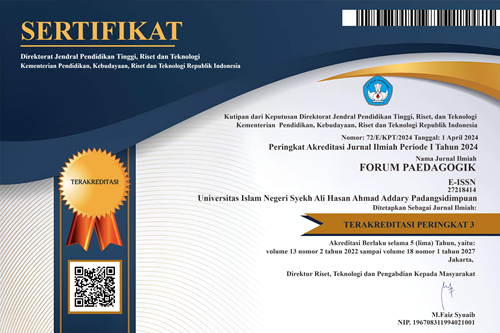STUDENTS' TOLERANCE ATTITUDE IN RESPONDING TO RELIGIOUS AND CULTURAL DIFFERENCES
This research examines the tolerance shown by teenagers towards religious and cultural differences in the city of Pematang Siantar. In social relations, understanding tolerance is an important key to creating harmonious relationships between individuals from different backgrounds. This research uses a qualitative approach with descriptive methods. This research method is observation, interviews, and documentation. This research aims to examine and explore more deeply the tolerance attitudes that teenagers must adopt in responding to religious and cultural differences that exist in the city of Pematang Siantar. The results of this research show that teenagers in Pematang Siantar have a positive attitude of tolerance towards religious and cultural differences with indications of awareness of the importance of social harmony. However, several challenges must be overcome, such as the lack of deep understanding among teenagers regarding pluralism and the existence of differences of opinion that are still developing among teenagers. So it is hoped that this research can provide more effective insight to increase the tolerant attitude of teenagers, especially in responding to existing religious and cultural differences.
Keywords : Tolerance; Youth; Religion And Culture
A. Harris, G. R. (2024). The Influence of Cultural Norms on Religious Observance. Journal of Religion and Culture.
A. Lee, R. T. (2023). Physical and Cognitive Development During Adolescence. Developmental Review.
Abdullah, M. (2013). Pluralisme Agama dan Kerukunan dalam Keagamanaan. Jakarta: Buku Kompas.
C. Garcia, J. P. (2021). The Impact of Social Media on Adolescent Identity Formation. Journal of Youth Studies.
E. Wilson, M. P. (2022). Exploring Cultural Diversity Through Religious Practices. Cultural Dynamics.
H. Martinez, L. B. (2023). Religious Beliefs and Cultural Practices: Distinctions and Overlaps. Journal of Cultural Anthropology.
Iskandar, T. (2022). PENDIDIKAN TAUHID TERHADAP MOTIVASI HIDUP DALAM PERSPEKTIF AL-QURAN. Reflektika, 397-412.
K. Smith, T. W. (2024). Cultural Identity and Religious Practices: A Comparative Study. Religion and Society.
K. Wong, E. M. (2024). Mental Health Challenges in Adolescence: A Review. Journal of Clinical Psychology.
Koentjaraningrat. (1999). Kebudayaan, Mentalitet, dan Pembangunan. Jakarta : Gramedia.
L. Anderson, B. T. (2021). Religious Identity and Cultural Assimilation: A Theoretical Perspective. Sociological Review.
L. Smith, M. J. (2022). Adolescent Development: The Role of Emotional and Social Changes. Journal of Adolescent Health, 56-70.
M. Patel, A. D. (2021). The Role of Religion in Shaping Cultural Norms. Journal of Cross-Cultural Psychology.
Moleong, L. J. (2000). Metode Penelitian Kualitaif. Bandung: PT. Siswa Rosdakarya.
N. Robinson, S. A. (2022). Educational Outcomes and Developmental Trajectories in Adolescence. Educational Psychology.
Nurlaila Sapitri, S. N. (2023). Textbook Analysis of Al-ʿArabiyyah Baina Yadai Aulādinā Vol 1 in The Rusydi Ahmad Thuaimah’s Perspective. Asalibuna, 1-13.
Putri Syahri, S. S. (2024). Implementasi moderenisasi agama di Kampus UIN Raden Fatah Palembang dengan tujuan bisa saling menghargai antar budaya dan agama. Academy of Education Journal, 278-287.
R. Johnson, N. G. (2022). The Interaction of Religion and Culture in Modern Societies. Contemporary Sociology.
Rahmad Hidayat, T. I. (2022). Strategi Meningkatkan Penghasilan untuk Kesejahteraan Keluarga Pedagang. Inovatif: Jurnal Ekonomi, Manajemen, Akuntansi, Bisnis Digital dan Kewirausahaan, 305-315.
S. Kumar, J. L. (2022). Culture and Religion: Divergence and Convergence. International Journal of Sociology and Anthropology.
Soekanto, S. (2000). Kamus Sosiologi. Jakarta: Royandi.
Sugiyono. (2008). Metode Penelitian Pendidikan Pendekatan Kualitatif, Kuantitatif, dan R&D. Bandung: Alfabeta.
Umi Kalsum, Z. Z. (2024). Strategi Ketua Jurusan PAI Kampus Universitas Ahmad Dahlan dalam Mengembangkan Kampus Merdeka untuk Mutu Lulusan. Journal of Education Research, 76-83.
UNESCO-APNIEVE. (2020). Belajar Untuk Hidup Bersama dalam Damai dan Harmoni. Kantor Prinsipal Uniesco untuk Kawasan Asia Pasifik, Bangkok & Universitas Pendidikan Indonesia.
 Copyright (c) 2024 Rayhan Aulia Annisa Ritonga, Syarbaini Saleh
Copyright (c) 2024 Rayhan Aulia Annisa Ritonga, Syarbaini Saleh

This work is licensed under a Creative Commons Attribution-ShareAlike 4.0 International License.











